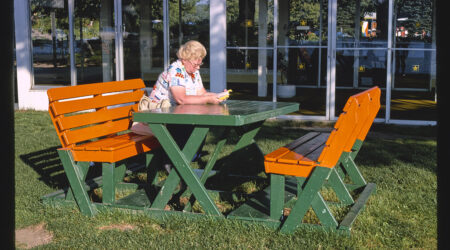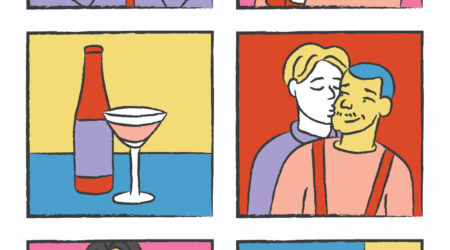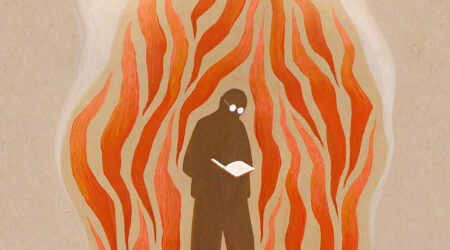Translated from Portugese by Zoë Perry.
So you tell yourself a story. It hangs out for a few hours, taking hold. At first, it feels like the story could have been told another way. But then you’re startled by the idea that no, maybe there is no other way to tell it, you tried, you really did.
A few days go by, and now, to tell the truth, you don’t want to tell the story any way other than exactly like that. The story found its shape. You look at it, as if looking into a black hole in space, and say: well, we won’t be changing anything in there, now will we? It’s the type of story that’s messy. You’re the only one who knows how hard it was. It’s better to get on with your life and see to it that its meaning holds still, or at least doesn’t move much. For a while, the story still plays on repeat, whenever it comes to mind, and you’ve got to admit that with everything that’s been going on you’ve tried not to think about it so much anymore. The story has become a mountain. The story has become a wave hitting the rocks.
Sometimes it comes back, with its metallic light, that atomic glow that frightened you so much. But you take a breath, and everything settles into place. You drink a glass of milk, eat a plum. Turn the key in the door once more.
Weeks go by. The story starts to lag behind. Life goes at its own pace, after all. But one day you wake up feeling a little funny, you’re having breakfast at the kitchen table, and it’s like someone’s taken an X-ray of your head, like someone’s suddenly turned on a very bright light. You realize that the mountain the story had become is now something else. It’s no more than a crumpled tarp, like some kind of rocky ridge, covering a bicycle in the garage.
You try to get it together. But something in the story makes your heart race. Now it’s as if there were a sheet of glass over it. The story is the same, but now there’s something else standing between you and it.
One afternoon, you leave your car in a parking lot and walk across a square to the street where the house in the story is located. You have to look for it. It’s been a while since you were last there. A lot has changed. When you finally recognize the house, you look for the story inside your head and try to tell it to yourself again. There’s a deceptive pleasure in this; the story takes on a distant and displaced air. Now you can make out some spots on the story’s skin. Granules that look like snow. But it’s not snow.
The story is getting distorted by the heat, the light, the noise of the street. Or is it you that’s doing it? Even though it’s exactly the same (New Year’s Eve, the two of you together, bicycles, the sea), the story no longer looks much like the one you told yourself that day. The story has also blended with other stories salvaged by the story itself, and it becomes difficult to separate them from each other, to understand where one begins and the other ends. This becomes a problem, or at least it’s a problem as you try to put the story in order, and, my God, you’ve told the story so many times, there’s no way you can’t do it now.
You hold your palm over the flame of a lighter. You water the plum tree. You make a paper boat, knit a pair of mittens, because winter is here. In the living room, the dim glow of a lamp, an armchair. In the kitchen, no voice. So you say, angrily: I’m going for a walk! And grab your bag, slamming the door behind you.
It’s late, it’s cold, and in the dark, you walk. You look for the story, as if praying. But its origin and the details got lost. Was there a night you helped a cat get home? Was there a night when you were unable to speak and got scared? You pick up the pace, and suddenly you’re crying. But you shouldn’t be crying. You need to find a way to tell this story. You put your hand in your pocket, as if it might be in there somewhere.
Emelio Fraia was named one of Grant’s Best Young Brazilian Writers. His book, Sebastopol, translated by Zoë Perry, is published by New Directions.






